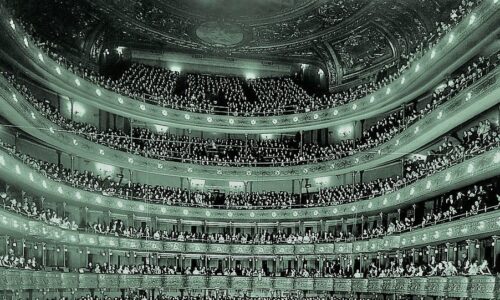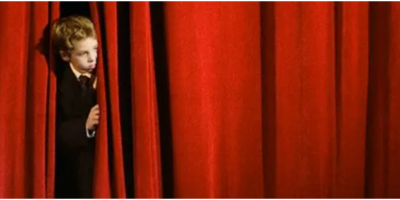About bad nerves and stage fright
I imagine every singer or performer has suffered from bad nerves or ‘stage fright’ at one time or another. It can be a sobering experience to look out into a large space and realize that right now all eyes are on you. Contrary to popular belief, I would venture to say that the vast majority of performing artists tend to be introverted, introspective and self-critical. There are, of course, exceptions to this rule. However, the extremely extroverted artist is more likely to be in the public eye, if only because they ARE more extroverted personalities.
The devil-may-care attitude
Over the years I myself have suffered from terrible pre-performance nerves. It often made me irritable, momentarily unfriendly, and partially unaware of the actions and reactions of those around me. I would venture to say that the majority of artists who try to concentrate on the task at hand can be this way, even if they don’t show it outwardly. On the other hand, I have known a few people in my profession who breeze through performances with the devil-may-care attitude of someone spending a few leisurely hours in a Viennese coffeehouse. I envied these people. After a while, I wondered if this was just their nature, or if they had learned how to deal with their nerves, and how to channel their energies in a more useful way to stabilise their nervous costume and ensure the ability to do their job in a professional manner.

A form of negative self-torment
Some people, I think, are just born that way. They see every situation and performance as an unknown adventure to be explored and enjoyed to the full. I think they are very lucky. Many, however, see a performance solely as a solemn duty to respect the music, the art form, and their obligation to the paying audience. Often, however, they can allow this heightened sense of duty to mutate into a form of negative self-torment. This is where stage fright comes in.
The performer becomes full of doubt. Am I good enough? Have I prepared adequately? Will my voice fill that big space? Will the conductor give me the cue I so desperately need and have asked for 5 times? And on and on and on. While it is natural for a performer to want to give his or her best, dwelling on these aspects of the task at hand can be self-defeating, often creating an attitude that can quickly make one unpopular with those around the nervous performer. Nerves can turn into stubbornness, leading to a refusal of collegial support and a generally distant attitude from those around you. I myself have often felt like Dr Jekyll and Mr Hyde, almost incorrigible and slightly unpleasant at work, humorous and relaxed in the beer garden with a few friends and colleagues after the performance.
Dealing with this ‘affliction’
So, to get to the point, how do you deal with this ‘affliction’? Suppose you go out to give your performance and everything goes to hell in a handbasket. The page-turner gets the hiccups, the stage lights go out, you sit down in front of the orchestra only to discover that your zip is half down, your shoelace is broken, your bow tie is in your other jacket, you brought the wrong score to church, you are suddenly TOTALLY hoarse from allergies. Etc, etc, etc, etc, rinse, repeat.

Firstly, I’ve been there over the years and yes, I’ve experienced all of this and much more. The good news is that although these things can be upsetting and embarrassing at the moment, nobody dies as a result and the world does not stop spinning.
A shrine in his dressing room
I have met many artists, some quite famous, who have developed their own techniques to combat their nerves before and during performances. I knew a famous Italian tenor who basically built a shrine in his dressing room and prayed fervently, often in tears, throughout the performance. Another liked to play pranks on his colleagues during the performance to release his nervous energy, which was not always well received. I knew another who would spend so much time admiring himself in the mirror as his character that he needed an extra person to make sure he got on stage as he was completely absorbed in himself and his role. Another would shout at the dressing room mirror that he was the greatest living tenor until he believed it for the short time he had to sing. I call this ‘cognitive dissonance as a tool’. Whatever works is permissible, I’d say, as long as you don’t go overboard and distract your colleagues.
Maybe it’s good to be serious about your work as a singer or instrumentalist, as long as the doubts don’t overtake you and lead you into a negative downward spiral. Don’t take it TOO seriously, even the bad days are over in 24 hours. On a side note, I keep a CD of a few gigs where I literally crashed and burned, my personal ‘Black Swan’ collection. It keeps me reasonably humble.
Have a good day, it is a jungle out there!


Tom! I resemble these remarks, er, article! And you’ve known some of my history, performed with me, as well. But I’ve improved & “cleaned up” from my naughty ways (it’s been about 35 yrs!). As easy as I made performances look, it was still (partly) an act. Mainly, now, I work as hard as I can: to respect the Art as a whole, to do my best humanly-possible performance, to not disappoint MYSELF with what my “best” is (that day), relative to what I put into my practise. There have actually been a few times I was proud of that… Read more »